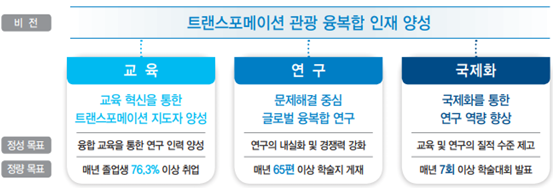BK21 - Tourism
BK21

Visit: https://100tourism.hanyang.ac.kr/
The ‘Tourism Education Research Team on Transformation to Homo Hundred’ researches to respond to the rapidly changing tourism industry, with keywords such as [Transformation Tourism], [Homo Hundred], [Smart Tourism], [Transitional Learning], [Convergence in Tourism Research], [Environmental Change in Tourism], [Fourth Industrial Revolution], [Individualized Learning], and [Wellness Tourism]. In detail, the research team conducts research and shares those resources with related organizations to establish networks with the industry, academia, and research institutes.
Vision and goal

Financial Aid
The Department of Tourism plans to provide about 900 million won worth of scholarships to BK graduate students (master’s/doctoral/Ph.D. Candidates) over the seven years. Moreover, about 110 million won worth of scholarships are awarded during the second semester of 2020 and the first semester of 2021.
Incentive Award
Awards and scholarships are granted every semester to the top 15% of the BK graduate students through relative evaluation based on the research results and academic conference presentations.
Research Facility Support
The Hanyang University Research Center (HIT) Room No.317 (27 seats) and the Graduate Student Lab on the 7th floor of the College of Social Sciences (18 seats) are occupied for the graduate students to study tourism science and to conduct research in excellent condition. The facilities will help foster outstanding students and to strengthen the research competencies.
Expense Support for Academic Conference Participation
Domestic and international participation expenses for various academic conferences and events are supported by the Department of Tourism to proactively respond and identify research trends.
Special Lecture Benefits
Experts in academia and the field are invited at least three times a year to provide opportunities for students to strengthen and preserve sufficient knowledge required by society.
Career Path
The BK graduate students are being employed in public institutions, public corporations, research institutes, and universities since they have been trained as professionals with research capabilities and practical skills during the BK period.